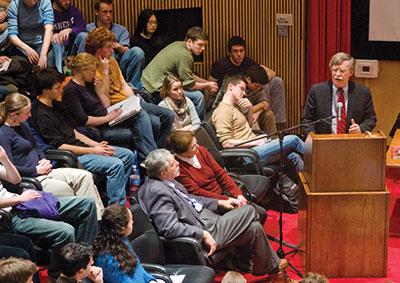By Emily Gold Boutilier
 On campus, former ambassador John Bolton (right) told the audience that there are two options in dealing with Iran's nuclear program: regime change or, as a last resort, targeted use of force. |
When John Bolton, former U.S. representative to the United Nations, spoke on campus in December, North Korea and Iran were on his mind. “Neither country will be talked out of its nuclear weapons program voluntarily,” he said. “These weapons, in both cases, represent trump cards for their regimes that are too valuable to be given up for any peaceful incentive.” He said that in dealing with Iran’s nuclear program, there are but two options: regime change or, as a last resort, targeted use of force.
It was standing-room-only at the lecture, held in Cole Assembly Room and sponsored by the Committee for the American Founding, a group created by Hadley Arkes, the Edward N. Ney Professor of Jurisprudence and American Institutions. The title of the talk was “Dealing with Rogue States After Iraq.” Bolton, a longtime American diplomat and Republican insider, served in the U.N. post from August 2005 to December 2006.
On Iraq, Bolton said, “do not succumb to the mythology that somehow our concern about those chemical weapons came from faulty intelligence or cherry-picked intelligence or spun intelligence or outright falsehoods by the administration. It came from Iraq’s own 1991 declaration.”
A dozen anti-war demonstrators (local residents, not Amherst students) gathered outside before the talk. Inside, one of them, his hands painted red, shouted that Bolton had blood on his hands. But the audience demanded that the protestor quiet down so Bolton could speak.
When he took questions, Bolton went head-to-head with Lawrence Douglas, the James J. Grosfeld Professor of Law, Jurisprudence and Social Thought, after Bolton said the impetus for the Nuremburg war trials came from the Russians. (Douglas: “That’s wrong.” Bolton: “No, it is not wrong.” Douglas: “I wrote a book on this.”)
Bolton also responded to a question about his 1994 remark that if the United Nations building “lost 10 stories, it wouldn’t make a bit of difference.” It was a general comment on bureaucracy, he said, and “after 16 months in New York, there’s no doubt in my mind that I was right.”
Farris Hassan ’11 was among the 22 students, professors, staff members and alumni—liberals and conservatives alike—to have dinner with Bolton that evening. Over chicken and wild rice, Bolton discussed everything from the Middle East to his last visit to the Pioneer Valley (it was in the 1960s, and he was visiting a young woman in Northampton—he didn’t elaborate). “The media presents a caricature of him as a gruff, hardheaded brute,” Hassan said after the meal. “But at dinner, he was affable and witty.” Arkes planned the dinner so that guests could raise questions in an intimate setting. “It’s the difference,” Hassan said, “between being able to say, ‘I met the man,’ and ‘I heard the man.’”
Photo by Charles Quigg '09